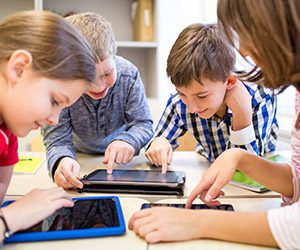Blog archive
-

Measuring Student Learning about Computing
President Obama’s recent initiative, Computer Science for All (CS4All), emphasizes the need to teach computer science (CS) as part of the regular K-12 curriculum. An important part of teaching is measuring learning. For example, teachers need to measure learning so that they can better help students learn. Likewise, students and parents want schools to document what students…
-

Identity: The Critical Security Factor
There are many factors that impact the effectiveness of security programs, ranging from camera selection and placement, to the password strength policy and even the reliability of power systems. But, perhaps the single most critical factor for security is one that cuts across many aspects of its implementation: the concept of identity. Many aspects of…
-

Balancing Widespread Use and Positive Learning Impacts of Educational Technology
Today, technology developers can get their innovations into the hands of many users quickly, giving them the opportunity to gather user feedback they can use for product improvement. Educational technology product design is no exception, as illustrated by the Khan Academy, which grew from a few YouTube videos to a million users in less than…
-

Teacher Professional Development Can Make a Positive Impact on Students’ Writing Skills
Effective communication skills are crucial for students as they prepare for college, careers and civic engagement. Acknowledging the importance of writing, states across the nation have adopted new standards to advance students’ writing skills; however, most students are not experiencing instruction that aligns with those standards. Because the new standards require a new way of…
-

High-Impact Innovation in Government is Within Reach
For decades, governments have been concerned with the capacity of their residents and institutions to pursue science- and technology-based innovation widely accepted as the foundation of sustainable economic growth. Only recently have public entities begun to focus on the importance of innovation in how they carry out their own public missions. Recognizing the need to…
-

Access to International Baccalaureate Programs in the United States Increases for Low-Income Students
Since it was established in 1968 to provide high schools students with qualifications that are recognized by universities around the world, the International Baccalaureate (IB) Diploma Programme has developed a reputation for rigorous academic standards. Students who score well enough on individual IB exams can earn college credit for their high school IB coursework. In…
-

Empowering Adults to Thrive at Work: Personal Success Skills for 21st Century Jobs
SRI Education and The Joyce Foundation have released a report that maps out how evidence-based research provides guidance for promoting personal success skills for adults who are striving to build 21st century careers. Personal success skills are the capabilities—complementary to disciplinary and technical knowledge—that enable adults to deal with the challenges, relationships, transitions, and social systems that…
-

Radiative Cooling Holds Promise for Thermoelectric Power Plants
The U.S. Department of Energy’s ARPA-E ARID program is exploring novel ways to use air-cooled heat exchangers and supplemental cooling systems to carry away waste heat in thermoelectric power generation.
-

Combining Capabilities to Address the Zika Emergency
Although discovered in the late 1940s, the Zika virus was not well studied until recently. Zika is not a life-threatening disease for adults, and didn’t attract the attention of most researchers who study mosquito-borne diseases until this past year, when the number of cases increased dramatically in South and Central America. In fact, it’s likely…
-

Progress Toward Quality K-12 STEM Education: Resources for Policymakers, Researchers and Educators
STEM (science, technology, engineering, and mathematics) education quality has a major impact on economic prosperity. In the 20th century, more than half of the growth in income per capita in the United States was due to advances in science and technology. Yet today, 15-year-olds in the U.S. score below their counterparts in 21 countries on the Program for International…
-

Beyond Screen Time: Insights on Using Digital Media With Young Children
In this post, we describe how new research from Education Development Center(EDC) and SRI can inform and advance the dialogue on this important topic.
-

Science in California’s Public After-School Programs: New Insights Provide Guidance for Improvements
How can students keep learning science when the school day ends? The informal environments of after-school programs are a natural fit for hands-on science and developing inquiry skills—such as posing questions, designing scientific investigations, and creating explanations based on observations. After-school programs have the potential to boost students’ interest in science, technology, engineering and math…